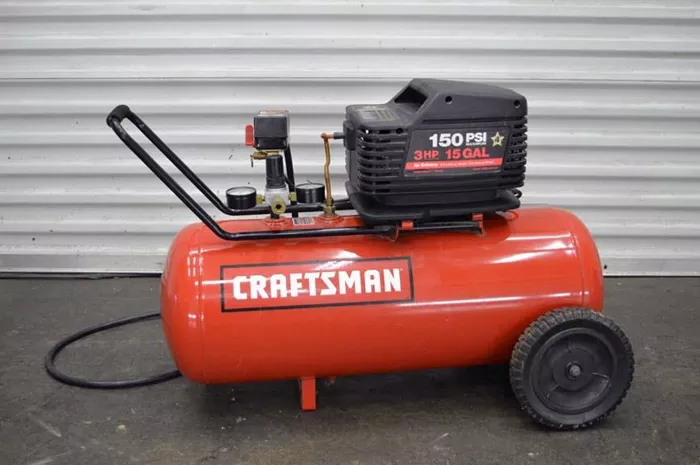Air compressors are essential tools for countless tasks, from inflating tires to powering heavy-duty machinery. But with so many options available, choosing the right one can be overwhelming. One common question is: Is a 150 PSI air compressor good? In this guide, we’ll explore everything you need to know about 150 PSI air compressors, including their power, performance, applications, and more.
What Does 150 PSI Mean?
PSI stands for Pounds per Square Inch, a unit of pressure that measures how much force the air compressor can deliver. A 150 PSI air compressor can generate up to 150 pounds of pressure per square inch, making it a powerful tool for a variety of tasks.
Key Features of a 150 PSI Air Compressor
1. High Pressure Output
A 150 PSI air compressor delivers high pressure, making it suitable for demanding tasks like operating pneumatic tools, spray painting, and sandblasting.
2. Versatility
With its ability to handle both light and heavy-duty tasks, a 150 PSI air compressor is a versatile addition to any workshop or job site.
3. Durability
Most 150 PSI compressors are built with robust materials to withstand frequent use and harsh conditions.
Advantages of a 150 PSI Air Compressor
1. Power for Heavy-Duty Tasks
The high pressure output makes it ideal for tasks that require significant force, such as running impact wrenches or jackhammers.
2. Faster Work Completion
With more power, you can complete tasks faster, saving time and increasing productivity.
3. Suitable for Professional Use
Contractors and professionals often prefer 150 PSI compressors for their reliability and performance.
Disadvantages of a 150 PSI Air Compressor
1. Higher Cost
These compressors are generally more expensive than lower-PSI models due to their advanced features and capabilities.
2. Heavier and Bulkier
The increased power often comes with a larger size and weight, making it less portable than smaller units.
3. Overkill for Light Tasks
If you only need an air compressor for light tasks like inflating tires or balloons, a 150 PSI model may be more than you need.
Applications of a 150 PSI Air Compressor
1. Industrial Use
In factories and workshops, 150 PSI compressors power heavy machinery and tools.
2. Automotive Repairs
Mechanics use these compressors for tasks like tire inflation, painting, and operating pneumatic tools.
3. Construction Projects
From nail guns to jackhammers, 150 PSI compressors are essential on construction sites.
4. Home DIY Projects
For serious DIY enthusiasts, a 150 PSI compressor can handle tasks like sanding, painting, and woodworking.
How to Choose the Right 150 PSI Air Compressor
1. Determine Your Needs
Consider the tasks you’ll be using the compressor for. If you need it for heavy-duty work, a 150 PSI model is a great choice.
2. Check CFM Ratings
CFM (Cubic Feet per Minute) measures airflow. Ensure the compressor’s CFM rating matches the requirements of your tools.
3. Consider Tank Size
Larger tanks provide more consistent airflow, reducing the need for the compressor to cycle on and off frequently.
4. Evaluate Portability
If you need to move the compressor around, look for models with wheels and handles for easier transportation.
5. Budget and Brand
Compare prices and read reviews to find a reliable brand that fits your budget.
Maintenance Tips for a 150 PSI Air Compressor
1. Regular Inspections
Check hoses, connections, and seals for wear and tear to prevent leaks and ensure optimal performance.
2. Drain the Tank
Moisture can accumulate in the tank, leading to rust. Drain the tank after each use to prolong its lifespan.
3. Change the Air Filter
A clean air filter ensures efficient operation and prevents dust and debris from entering the system.
4. Lubricate Moving Parts
Regular lubrication reduces friction and wear on moving components, keeping the compressor running smoothly.
5. Monitor Oil Levels
For oil-lubricated models, check and maintain proper oil levels to avoid damage to the pump.
Safety Precautions When Using a 150 PSI Air Compressor
1. Wear Protective Gear
Always wear safety glasses, gloves, and hearing protection when operating the compressor.
2. Follow Manufacturer Guidelines
Adhere to the operating instructions provided by the manufacturer to avoid accidents.
3. Avoid Overloading
Do not exceed the compressor’s maximum pressure rating, as this can lead to equipment failure or injury.
4. Proper Ventilation
Ensure the compressor is used in a well-ventilated area to prevent overheating and reduce the risk of carbon monoxide buildup.
5. Shut Down Properly
Turn off the compressor and release pressure from the tank after use to prevent accidental starts.
Frequently Asked Questions About 150 PSI Air Compressors
1. Can a 150 PSI Air Compressor Be Used for Home Projects?
Yes, but it may be overkill for simple tasks like inflating tires. It’s better suited for heavy-duty DIY projects.
2. How Long Do 150 PSI Air Compressors Last?
With proper maintenance, a high-quality 150 PSI compressor can last for many years, even with frequent use.
3. Are 150 PSI Air Compressors Noisy?
Most compressors produce some noise, but models with noise-reduction features are available for quieter operation.
4. Can I Use a 150 PSI Air Compressor for Spray Painting?
Yes, the high pressure makes it ideal for spray painting, ensuring a smooth and even finish.
5. What’s the Difference Between PSI and CFM?
PSI measures pressure, while CFM measures airflow. Both are important for determining a compressor’s performance.
Conclusion: Is a 150 PSI Air Compressor Good?
A 150 PSI air compressor is an excellent choice for those who need a powerful and versatile tool for heavy-duty tasks. Whether you’re a professional contractor, a mechanic, or a serious DIY enthusiast, this type of compressor can handle a wide range of applications. However, it’s important to consider your specific needs, budget, and maintenance capabilities before making a purchase.
By understanding the features, advantages, and limitations of a 150 PSI air compressor, you can make an informed decision and ensure it’s the right tool for your projects. With proper care and maintenance, a 150 PSI compressor can be a reliable and long-lasting addition to your toolkit.

